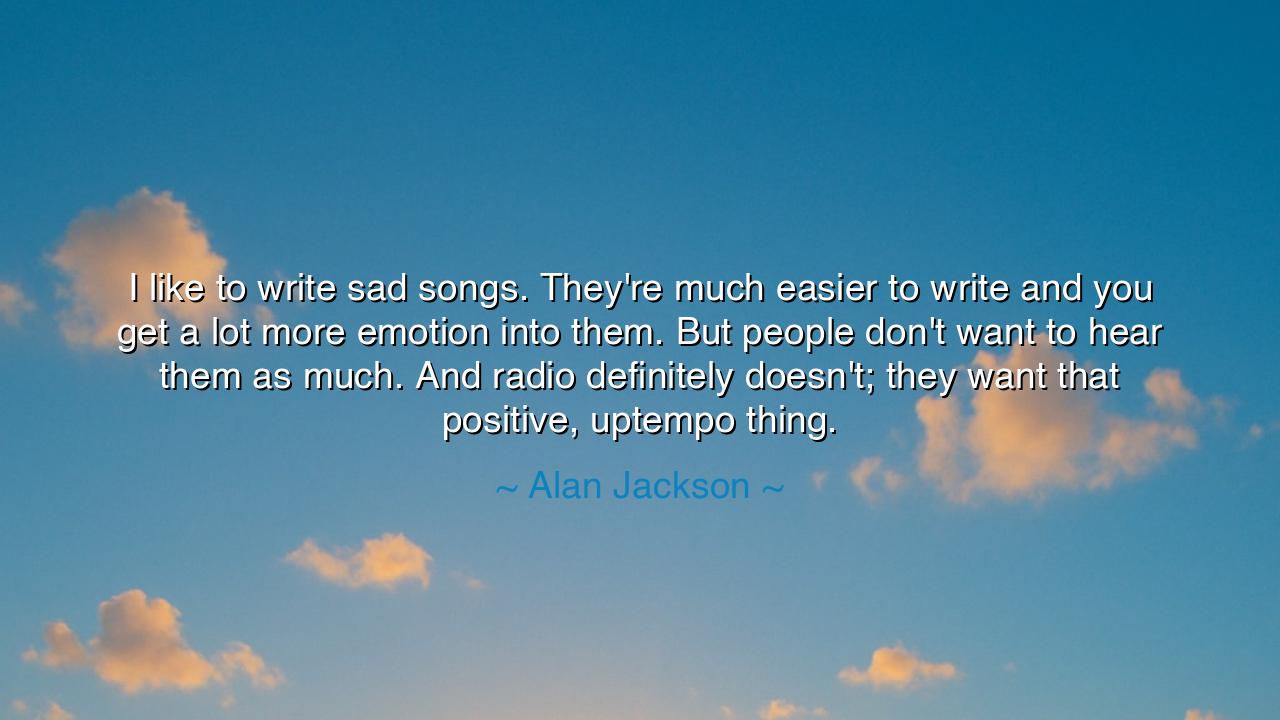
I like to write sad songs. They're much easier to write and you
I like to write sad songs. They're much easier to write and you get a lot more emotion into them. But people don't want to hear them as much. And radio definitely doesn't; they want that positive, uptempo thing.






Hear, O seekers of melody and truth, the words of Alan Jackson, who spoke with the candor of a craftsman of song: “I like to write sad songs. They’re much easier to write and you get a lot more emotion into them. But people don’t want to hear them as much. And radio definitely doesn’t; they want that positive, uptempo thing.” Within these lines is the eternal tension between the heart of the artist and the appetite of the crowd, between the truth of sorrow and the marketplace of cheer.
First, let us dwell upon the power of the sad song. It springs from the deep wells of the human soul, from grief, longing, and the unspoken ache that dwells in every heart. To write of sorrow is to draw upon truth, for pain leaves marks that joy often cannot. The poet finds in sadness an honesty unmasked, and so the words flow freely, heavy with authenticity. This is why Jackson admits such songs are “easier to write”—not because they require less craft, but because they come unbidden, pulled forth by the hand of memory and the weight of life.
Yet here lies the paradox: though sorrow gives birth to the most profound songs, the people, and especially the radio, hunger for the uptempo. The market demands the cheerful refrain, the light rhythm, the song that distracts rather than confronts. It is not that audiences never want sad songs, but that the world, weary of its own burdens, often seeks escape rather than reflection. Thus, the artist’s deepest offerings are sometimes set aside, while the simple tunes of surface joy are exalted.
History has seen this before. Consider the tale of Franz Schubert, who poured his soul into lieder heavy with grief and longing, songs like Der Leiermann, which spoke of desolation and despair. Yet in his lifetime, he was far less celebrated than composers of lighter pieces. Only long after his death did the world realize that in his sorrowful songs lay unmatched genius. Just as Schubert’s pain birthed greatness, so too do Jackson’s words remind us that the sad song is often the truest, even if it is not the most celebrated.
The deeper meaning of Jackson’s reflection is that art’s most authentic expressions are not always what society values in the moment. The artist feels compelled to write what is honest, but the world often rewards what is easy. Thus, the calling of the artist is both noble and painful: to create works that reveal the soul, even when they are not what the masses demand. True greatness lies not in catering to the moment, but in capturing eternal truths that endure long after the “uptempo” trends fade away.
So let us take this lesson to heart. Do not always seek what is cheerful, nor demand only songs of light. Learn to value the sorrowful melody, for in it lies a reflection of your own hidden griefs, the sorrows you dare not name. To hear a sad song is to be reminded that you are not alone, that others too have walked the valley of shadows.
And so, O listener, I say: when you create, do not fear the truth of your heart. If your spirit compels you to write in sadness, do not silence it for the sake of applause. If you are an audience, do not turn away from the heavy song, for it may heal you more than the dance tune ever could. The world needs both joy and sorrow, both emotion and release. Honor them equally, and you will walk in balance. For as Alan Jackson has taught us, sorrow may not always fill the airwaves, but it will always fill the soul with truth.






AAdministratorAdministrator
Welcome, honored guests. Please leave a comment, we will respond soon